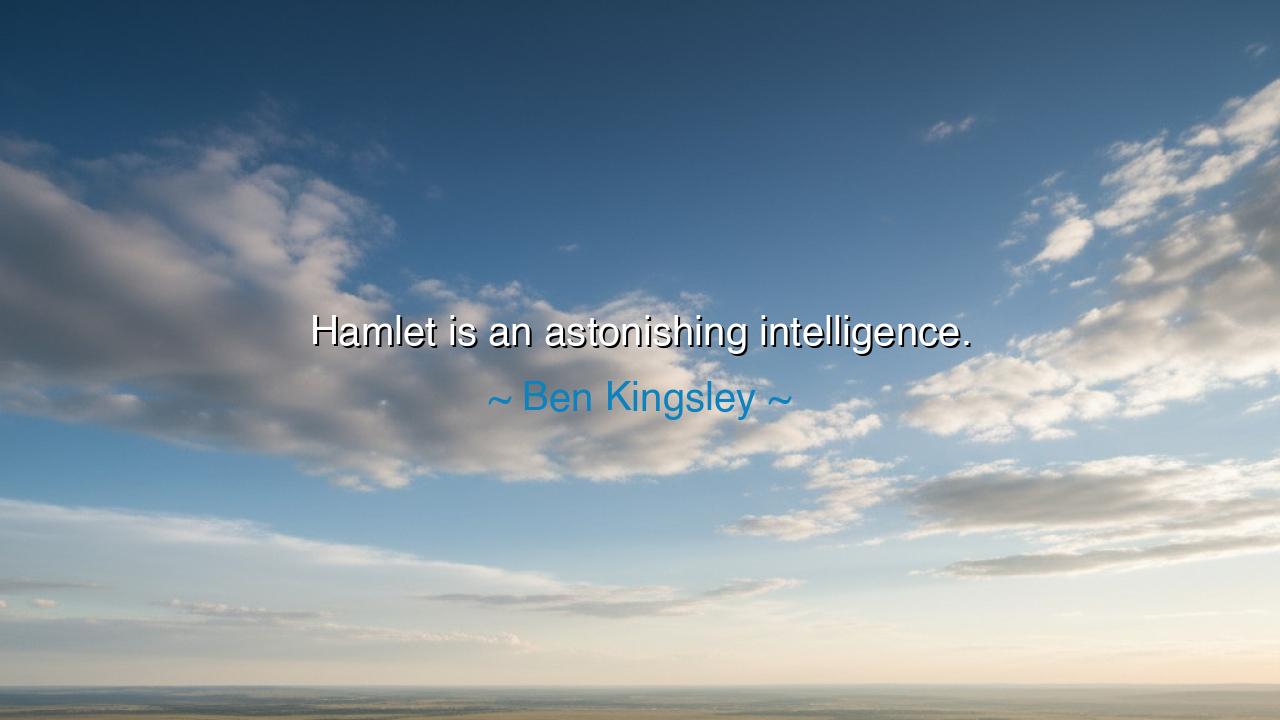
Hamlet is an astonishing intelligence.






In the vast realm of human thought and imagination, there stands one figure who has haunted minds and stirred hearts for centuries — Hamlet, the Prince of Denmark. Of him, the great actor Ben Kingsley once declared, “Hamlet is an astonishing intelligence.” Few words could so precisely capture the essence of this timeless character, for Hamlet is not merely a man within a story — he is the mirror of the human soul, the embodiment of intellect in torment, reason in conflict, and consciousness awakened to its own depth.
Kingsley, himself a master of the stage, understood that intelligence, in its purest form, is not only the ability to think, but to feel deeply while thinking clearly. In Hamlet, Shakespeare forged an intelligence that is both gift and curse — a mind that perceives too much, questions too deeply, and sees through the fragile veils that others mistake for truth. To call Hamlet an “astonishing intelligence” is to acknowledge that within him lives the full grandeur and agony of awareness. His mind is lightning — brilliant, unpredictable, and devastatingly honest.
The origin of Hamlet’s brilliance lies not only in Shakespeare’s pen but in the eternal human struggle between thought and action, knowledge and duty. From the moment Hamlet learns of his father’s murder, he becomes a being divided — his reason seeks justice, but his conscience trembles before blood. He does not act blindly, for his mind demands certainty, and that demand, that relentless inquiry into truth, becomes both his power and his prison. Thus, Kingsley’s insight reveals a paradox: to be deeply intelligent is also to be deeply burdened. Those who see all sides of truth are often torn by its contradictions.
In history, we find this same tragedy in the lives of those whose vision outstripped their time. Socrates, the philosopher of Athens, questioned every certainty, exposing ignorance where others claimed wisdom. Like Hamlet, he was condemned not for folly, but for knowing too much — for piercing through illusion with the blade of reason. The same fire that illuminates can also consume. Yet, both men remind us that intelligence, when joined with integrity, becomes the highest form of courage. It is easier to follow, easier to act in ignorance; it is far harder to question and still remain true to one’s conscience.
To call Hamlet an astonishing intelligence, then, is not to praise mere cleverness, but the tragic majesty of a mind awake — a mind that cannot rest in the simple answers the world offers. His soliloquies are not performances but meditations, echoing the questions of every human soul: What is right? What is real? What does it mean to exist, to suffer, to act? Through Hamlet, we see the divine spark of curiosity that makes humanity both noble and restless — the eternal thirst to understand the mystery of being.
And yet, there is warning in his brilliance. For thought without balance, reflection without resolve, can lead to paralysis. Hamlet’s mind, vast as the sea, is often caught in its own tide. Kingsley’s observation, though full of admiration, carries a shadow of recognition — that intelligence, however astonishing, must be tempered with will. The wisest among us must learn when to ponder and when to act, when to seek truth and when to live it. Unanchored intellect can drift into despair; guided by purpose, it can shape the world.
So let this teaching be carried into your own heart: cherish your intelligence, but do not let it isolate you. Question boldly, as Hamlet did, but remember also to choose, to move, to live. Seek understanding not only in words, but in deeds. For the mind, no matter how brilliant, finds its fulfillment only when joined with courage and compassion.
In the end, Ben Kingsley’s words are not merely about a prince in a play, but about every thinking soul. To be “an astonishing intelligence” is to awaken fully — to feel the weight of knowledge and still strive toward light. It is to stand, as Hamlet did, between heaven and earth, between doubt and destiny, and to whisper, as all great thinkers must: “To be — or not to be — true to what I know within.”






AAdministratorAdministrator
Welcome, honored guests. Please leave a comment, we will respond soon